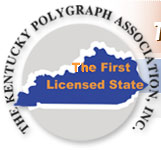KPA, Inc. Standards and Practices
In order to achieve unity of purpose, to assure a clear concept of obligations to each other and to the profession, and to provide for the continuing welfare and protection of the general public, all members of the Kentucky Polygraph Association have agreed to abide by the following Standards and Principles of Practice.
- A member shall recognize the fact that his primary responsibility must be to the person who has volunteered for a polygraph examination, regardless of the circumstances which created the need for the examination.
- Recognizing that a polygraph examination cannot be conducted on a person against his will, no member will attempt to conduct an examination when he has reason to believe the examinee has been subjected to coercion or duress. Further, no member shall conduct any examination on a person without first advising the examinee of the rights enjoyed by every American citizen against self incrimination and invasion of privacy.
- No member shall conduct an examination on any person unless he uses an instrument which makes a permanent simultaneous recording on a moving chart of at least two physiological tracings: the pneumograph and the cardiosphymograph. This shall not preclude the recording of additional physiological phenomena on the same charts. The provisions of this paragraph shall be subject to such modification as may be required to comply with any state or federal licensing regulation.
- No member shall conduct an examination on any person whom he believes to be physically or psychologically unfit for testing, in case of doubt as to the propriety of administering a test in any given situation, the member shall seek expert guidance, a competent medical or psychological authority prior to testing.
- No member shall render a conclusive verbal or written decision or report on a specific examination based on chart analysis without having administered two or more polygraph charts.
- No member shall terminate a polygraph examination without affording the examinee a reasonable opportunity to explain and to eliminate any reactions which are evident on the charts. Further, no member shall accept the explanation of the examinee for a chart response without verification.
- No member shall, unless professionally qualified to do so, include in any written report any statement purporting to be a medical, legal, or psychiatric opinion or which would infringe upon areas under the cognizance of professionals in those fields. This shall not preclude the examiner from describing the appearance or behavior of the examinee, if this is pertinent to the examination, as long as the examiner refrains from offering any diagnosis which he is professionally unqualified to make.
- A member shall not conduct an examination where he has reason to believe the examination is intended to circumvent or to defy the law.
- A member shall not conduct an examination where he has reason to believe the examination is intended to interfere with or to prevent the lawful organizational activities of a labor union.
- A member shall not solicit or accept irregular fees, gratuities, or gifts which may be intended to influence his opinion or decision. Further, no member shall set a fee for professional polygraph services contingent upon the findings or results of such services; nor shall he increase any initial fee as a direct result of his findings during any polygraph examination.
- A member shall not knowingly issue or permit his employees to issue a polygraph examination report which is misleading, biased, or falsified in any way. Each polygraph report shall be a factual, impartial, and objective account of the pertinent information developed during the examination and the examiner's professional conclusion, based on analysis of the polygraph charts.
- A member shall be guilty of gross negligence if it be proved that he did not in fact obtain data reported as factual in any polygraph report. Further, it shall be deemed highly unethical for any examiner to express verbally or in writing a test conclusion which is based solely upon subjective opinion or personal assumption. This does not preclude a professional judgment baded on analysis of the polygraph charts, in the absence of substantive admissions by the examinee.
- A member shall not publish nor cause to be published any false or misleading advertisements relating to the polygraph profession.
- A member shall not offer testimony concerning the charts or conclusions presented by another examiner unless he is thoroughly familiar with the techniques and procedures used by the other member. This paragraph shall not prohibit a member from testifying concerning his independent examination of the same examinee.
- Any person who is convicted of a felony or a crime involving moral turpitude shall be ineligible for any class of membership in the Kentucky Polygraph Association.
- A member shall abide by decisions and recommendations officially adopted by the Kentucky Polygraph Association at any regularly scheduled meeting.
- A member who is a sworn law enforcement officer and who also works as a private polygraph examiner shall not conduct tests in criminal matters as a private examiner unless an appropriate release is obtained from the criminal defense attorney. This release acknowledges that the normal attorney/client privilege does not apply when the private examiner is also a sworn law enforcement officer and allows the member to report to the appropriate law enforcement authority any admissions of criminal wrongdoing by the examinee, in accordance with his sworn oath as a law enforcement officer.


